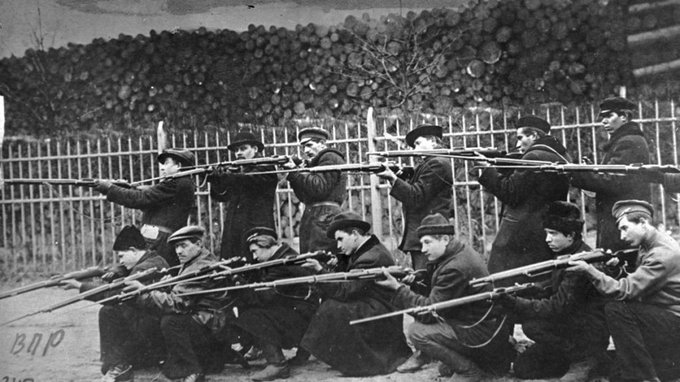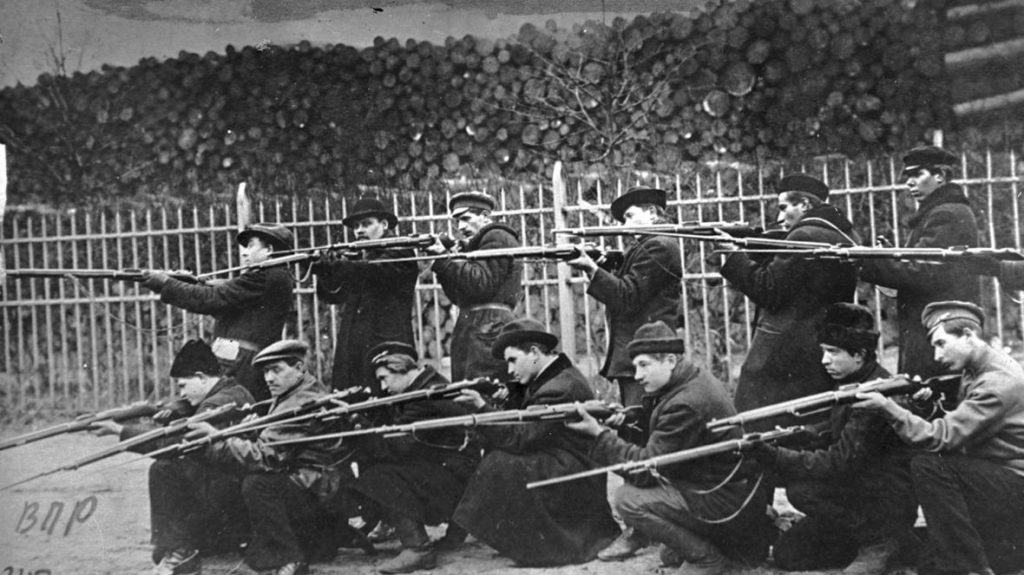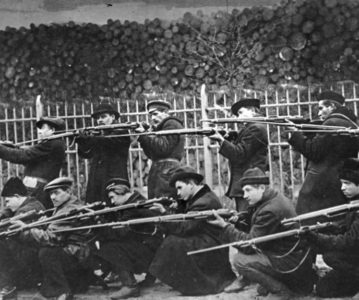Daniel Newman urges patience and caution in the face of current political turmoil. Reading: Cliff Connolly.

The worst economic crisis since the Great Depression. The deadliest pandemic since the Spanish Flu. The largest protest wave in U.S. history. The most dangerous political tensions in recent memory.
Our world is in crisis and you are afraid. Your friends are afraid. This is natural and inevitable. The question is how to grapple with this fear appropriately–how to channel it in a way that is rational and productive.
We are socialists and aspiring revolutionaries. Most of us are young, although this is of course not always the case. And we are dreading–and dreaming–of a fight. On one hand we are overjoyed by the unprecedented popular rebellion. On another we are enraged by the brutality of the police and disgusted by the hypocrisy of the liberal establishment. On one day we are terrified of impending violence and repression. On another we fear that this whole situation is a mirage and a waste of time, that we will always be marginal and politically impotent.
Even the tension between these emotions can be extremely distressing. It is enough to make any radical daydream about picking up a gun and marching to war. But this is not a war and you are not a soldier. You do not have military assets. You almost certainly lack military training. You do not serve in a unit, report to commanding officers, or live out your life in a barracks. A mass protest wave is not a war; a riot is not a war; even sectarian murder in the street is not, in itself, a war. If you pretend that these things are a literal war, you are at best a child playing with toy soldiers. At worst, you are putting yourself and your comrades at risk of injury, humiliation, even death, all for the sake of your ego.
The best thing you can be right now is patient. You can rise to the occasion and do the work our time demands with tremendous courage and dignity. But only if you accept that this work is almost entirely boring and unglamorous. You must observe the new world around you with a sober mind. Although it may fill you with terror and inspiration, do not let these feelings intoxicate you, and never pretend that you can predict the future. There are only a range of possibilities, some more likely than others, and some that will go completely unforeseen.
What Is Happening?
In your political reflections, you are probably used to thinking in terms of years (often single election cycles) or decades (when reflecting on long-term strategies). But right now you are being forced to think and live on a dramatically different time scale, one much shorter than what you are used to. Even the next two months seem impossible to imagine.
Political tensions are escalating. Urban unrest will continue to some degree, and the Right will continue to retaliate with despicable violence. We have yet to see whether the murders in Kenosha will encourage a protracted wave of right-wing attacks. Given the overt complicity of police and right-wing media, this seems quite likely.
American society has polarized in a way that is extraordinarily one-sided. Roughly one-third of the population has joined a paranoid right-wing lynch mob. Its champion is Trump, his family dynasty, and his court of lackeys and bootlickers. Hunting like a pack of wolves, the mob finds enemies around every corner and lumps all of them together. As socialists, we resent Biden and Trump, the Democratic Party and the Republicans. The Right does not perceive these divisions. It sees a united terrorist conspiracy of Antifa-Biden-Atheist-Communist-Muslim-illegal-Democrats, funded by Jewish bankers and Satanic pedophiles. MAGA loyalism has become a permanent political identity in the United States. Its hats may be red and it may “back the blue,” but its true color has always been the fiery orange of Donald Trump. It is armed to the teeth and thirsty for blood.
MAGA loyalists are dreaming of a savage civil war, but there will be no civil war. The vast majority of leftists understand this, but the point cannot be emphasized enough. There is no army interested in fighting such a war. The police may firmly support Trump, but they are schoolyard bullies with no capacity to fight a real army. Their armored cars would be flattened in ten seconds by the tanks of the U.S. military. And the military will act as one unit; it will not fracture into opposing sides. In the event of a disputed election, the military can be expected to present a face of cold neutrality, likely taking cues from other institutions such as Congress and the Secret Service. Its real concern will be to preserve order and the illusion of a democratic transition.
Talk of impending civil war is extremely irresponsible and only gives fuel to the Right’s demented fantasies. That leaves open the possibility of massive demonstrations, street fights, riots, and even terrorism, but not an actual civil war. Nor will it be a revolution. Not when the leader of the glorious Resistance is Joe Biden, a rule-follower and good old boy who will always prefer order to justice. The real decision-makers, the higher-ups orange and blue–Republican and Democrat–will almost certainly reach a settlement by January.
I won’t pretend to foresee the specific details. No one can. But our side–the real reds–will not get a slice of the cake. Not only socialists, but the entire progressive-minded constituency we appeal to will face repression, no matter who wins. An incoming Biden administration will be eager to distance themselves from and make an example of “violent” leftist protesters. The Democrats love bipartisanship. As defeated MAGA loyalists vent their rage in the streets, our new rulers will be anxious to launch an equal-opportunity crackdown. They will neutralize the wildest Trumpers by locking them up, and then they will appease the rest by arresting the rioters on our side. There’s nothing good coming soon.
That leaves you with two options. Flame out, or hold your fire and build something. It’s all too easy to flame out in anger and desperation.
You would not be the first young revolutionary to do it. Faced with electoral defeat and police repression, the Weather Underground took that path in the late 1960s and ’70s. As a radical splinter from the Students for a Democratic Society, the flagship organization of the 1960s campus left, they had grown quite tired of weak-tea social democracy. Eager for something more exciting, they raged and rioted all across America, plotting and scheming and blowing up buildings.
They bombed the Pentagon, the Capitol Building, the very heart of the federal government, all to bring on the revolution and destroy the American empire. It didn’t happen. All they destroyed was an endless lineup of ladies’ restrooms where they chose to plant their explosives. After a decade of hardship on the run, they finally learned that they could not overthrow America by vandalizing toilets.

On the bright side, you can meet them if you like. They’re alive and well today, and doing fine for themselves as writers, lawyers and professors. They’re still active in politics as well: some of them are working quite hard for Joe Biden.
They were intelligent young people with good intentions and in terms of underlying character, not very different from us. Their grief was the same as ours. They lived through an atrocious colonial war, riots, unprecedented protests, and the election of a vicious reactionary president. Fred Hampton, the great Black Panther leader, furiously demanded that they restrain themselves. Then the FBI and Chicago Police Department murdered Fred Hampton in his own bed, as he slept with his pregnant wife. The times drove the Weathermen to irrational and ineffective violence.
They were an extreme case, a fringe within a fringe. But their irresponsible decisions embodied and hastened the decay of the 1960s left. You have fewer excuses than they do. There was less cause for hope in the late 1960s and 1970s, more cause for total desperation. The urban riots of that era were almost completely contained in black communities—rage vented inward, excited by radical politics but incapable of truly advancing them. The white student left was courageous and filled with visionaries, but its principal grievance was limited to the Vietnam War. As that conflict was wound down, so too did white student revolt. State repression continued and the broad antiwar movement slowly died out, leaving the radical remnant to stew in their anger and grief.
Whatever we may be facing, it is not the end of mass revolt. It is a new beginning, the fitful awakening of Revolutionary America. We have witnessed something truly unprecedented in living U.S. history: an interracial uprising against police brutality, black people and white people, and many others physically fighting against state violence side by side. Our anger is not aimless; it is politicized. It has attacked political targets, invented political slogans, and raised explicitly political demands. Meanwhile, the broad social democratic movement–led until recently by Bernie Sanders–has displayed more focus and more hardheaded ambition than the freewheeling radicalism of the ‘60s left. Like the George Floyd Rebellion, its grievances are domestic, rooted in profound inequality and economic hardship. Its discontent will not easily be quelled, not without transformative changes to American society.
Although it may seem counterintuitive, these domestic grievances are also good for socialist internationalism. Every major college campus in America has its feel-good internationalists who protest against war as a pure show of idealism. But real internationalism, the kind that can mobilize and sustain millions of people, draws connections between struggles abroad and lived experiences at home. It is easier to sympathize with Palestinian demonstrators when you yourself have been tear-gassed by police. It is easier to be enraged by the coup in Bolivia when you yourself have organized with a democratic socialist movement. Real international solidarity is a two-way street. You both take and give inspiration. That is why the Russian revolutionaries fought for a revolution that would spread across Europe, why the Sandinistas hoped to spark revolt against dictatorships throughout Latin America, and why Irish revolutionaries dreamt of “taking their place among the republics of the world.” It is also why the George Floyd Rebellion inspired anti-racism demonstrations from Germany to Japan, and why volunteers across the globe traveled to America to assist the Bernie Sanders campaign. Despite decades of humiliation, the U.S. working class is beginning to display moments of exemplary struggle.
Our struggle is political. Bernie Sanders raised the pride, dignity, and self-esteem of a generation, giving it a new conception of its human rights and historic destiny. Despite his profound shortcomings, his disastrous defeat, and his cowardly sell-out to Joe Biden, engagement in the Bernie campaign was never a waste of time for leftists. Those of us who organized for him were exactly where we were supposed to be, playing out our part in a historical process that is much larger than any of us.
What the Hell to Do?
Your job now is to keep the flame burning, to help build a stronger vessel for working-class discontent than the Bernie Sanders campaign. Where can we do that? In the streets, with sticks and stones?
Absolutely not. Protests, even spectacular mass actions, are a useful way to harden our resolve, show our numbers, deliver immediate retaliation, and advance specific goals. They are certainly a necessary tool. But when activists artificially prolong and escalate them, they become an aimless ritual for thrill-seekers. The adrenaline of endless street rallies impedes sober reflection on political goals, making it harder for us to convert our attention-grabbing slogans into an inspiring vision. We have seen this dynamic many times since the eruptions in late May. Protest militants raise the most “radical” rallying cries they can imagine, such as full police abolition. Then, when asked hardheaded questions about what “abolition” actually means, they falter. Even the president of the Minneapolis City Council drifted into such vague posturing when she dismissed as “privileged” the question of how home invasions would be dealt with in a police-free world.
None of this is an insult to those of us who have risked life and limb in the streets. It is simply the invisible toll, mental and physical, of a strategy that focuses entirely on “action.” Prolonged exposure to stressful situations—including unpredictable demonstrations—raises cortisol levels in the body, increasing heart rate, blood pressure, anxiety, depression, fatigue, and irritability. This is only compounded by the constant stream of upsetting news that we are receiving daily from both friends and the media. Comrades should strive to avoid unnecessary stressors, exercise frequently, and recognize that all of us are experiencing heightened anxiety and lapsed judgment.
If there is anything you should learn from this ongoing protest wave, it should be the following:
1) The United States needs a profound, world-historic revolution.
2) Riots and unrest are not sufficient to bring one about.
If riots and unrest won’t cut it, what about spontaneous labor actions or a general strike? These ideas may seem like more constructive paths forward, but they are not! Most members of the American working class have never been on any kind of strike, let alone a disorganized “general” one. Now they are living through a national nightmare and are terrified for their economic future. You can’t convince people to risk their livelihoods and their family’s health by sharing slogans on Twitter. Labor organizing is a difficult process that requires tremendous patience, determination, and professionalism.
So, should you get involved in conventional labor activism? Certainly, if you can find a good opportunity to do so. But you must understand the limitations of this work. With several important exceptions, unions in the United States are controlled by liberals, by bureaucrats who align themselves with the same Democratic Party that heartlessly crushed the Sanders insurgency. These leaders have no real interest in empowering working people or waging militant struggle on their behalf. That is not an excuse to reject the labor movement, but it does call for perspective. Many socialists immerse themselves completely in union work, thinking that independent left politics will only be possible after labor realigns and grows itself a spine.
Don’t fall into that trap. Unions are under the political control, the political influence of Democrats. This means that they need a political alternative, a new civic identity and philosophy of action that can inspire rank and file members. We must establish this alternate pole of attraction. Reforming unions from within as isolated individuals would take decades to accomplish; it would force us to banish all independent political organizing to the distant future. In this time of crisis and upheaval, such a strategy is far too timid, gradualistic, and deferential to existing labor leaders. Where riots and wildcat strikes go too fast, union realignment goes far too slow.
So, should we return to working within the Democratic Party, aiming to realign it from within? We tried that twice in recent memory, and many more times in the past century. Every time, Democrats have crushed and humiliated these projects, and the recent Sanders defeat stings like none before it. Our conflict with the party establishment is not a gentle family disagreement. Much of our constituency is temporarily convinced of this, thanks to Biden’s shallow overtures and Trump’s terrifying brutality. But the illusion will not last.
Our conflict is a bitter struggle for power, and the emotional impulse to hit back against the Democrats is basically correct. If the Democrats take back control of the government, they will impose brutal austerity on America in the middle of an economic depression. They are making this goal increasingly obvious. In such a situation, we cannot afford to be junior coalition partners, gently criticizing and challenging them one-by-one in isolated low-turnout primaries. Millions of working-class people would rightly associate us with the party of Joe Biden, Nancy Pelosi, and Chuck Schumer, severely damaging our credibility.
We must overtly condemn the Democratic record and challenge their right to lord it over our country. We need an independent left political force, preferably a thoroughly socialist one, with a true national constituency. We need our own colors, our own branding and identity. We also need a commitment to a literal, old-fashioned revolution against Democratic neoliberalism, Republican reaction, and the elitist constitutional order that props up both of them. American socialists should draw lessons from the old anti-colonial struggles of the 20th century and learn to project a spirit of dignity, composed militancy, and self-assurance. For too long we have relied on wavering figures like Sanders and AOC as our public figureheads. The time is ripe to make our own debut as an independent force in American national politics. We can rely on ourselves alone.
This brings us to a simple conclusion: we need a party. We’ve needed one for a long time. We must bring it about as soon as possible. The obstacles to such a project are well-known and formidable.
But that is no excuse for us to evade our historic responsibility. We need to develop a new brand of revolutionary socialism that is tailored to our country’s unique history of struggle and its backward political institutions. We must do it together because no single person has all of the answers for such a monumental task.
That means we must begin by engaging in non-sectarian socialist organizations that are willing to accept open dialogue. The Democratic Socialists of America and the Marxist Center are prepared for this discussion and have quietly awaited it for years. Howie Hawkins and his socialist wing of the Green Party will also have a valuable role to play. Unlike Trotskyist and Stalinist groupings, all of these organizations are committed to political pluralism and capable of critical self-reflection. DSA will have a particularly unique responsibility because of its large membership base and relatively high public profile. Membership should view its 2021 summer convention as a pivotal moment to begin concrete steps towards an independent party.
In the coming months, independent-minded socialists should be as active as possible in their organizations. There is a great deal of organizing work that needs to be done. As winter arrives in the middle of an economic downturn, tenant organizing will become extraordinarily important. Tenant unionism has the potential to engage millions of Americans in victorious class struggle for the first time in their lives, and may well serve as the backbone of the coming revolutionary movement. At the same time, we should begin to discuss among each other the need for political independence and the immediate steps necessary to bring it about.
Prepare yourself mentally for the events of November through January and expect the unexpected. When mass demonstrations arrive, you may be driven to take part in them. But choose your battles with extreme caution and do not get swept away into militaristic posturing. At best you will be a reluctant pawn in a liberal PR campaign to win over the security state. The outcome will not be decided by civilian firepower.
Meanwhile, lawful community self-defense may very well be necessary in the coming years. But these efforts will require many months of reflection and formalized training; they cannot be rolled out on the spot. This is particularly true because the Left cannot emulate the right-wing militias that brutalize us. The Trumper militias are little more than undisciplined mobs; their only purpose is to dish out terrorism on behalf of the police. Our goal is to save lives, not to randomly shoot them down, to cultivate revolutionary discipline, not unleash our sectarian rage against soft targets.
Revolutionary discipline is many things. For some of us, it means holding back on truly violent impulses that put others in physical danger. For most of us, it means more mundane things, like avoiding needless infighting and looking out for the vulnerable comrades who are close to us. Above all else, it means maintaining a commitment to the movement, and remembering that politics comes before the gun (and even the megaphone).
A single spark can light a prairie fire, but it is much more likely to burn your house down. Remember that no matter what happens, when the dust settles the United States will have a right-wing president in January. The interesting things, the real action you want to stay alive for, will come afterwards. Because although we do not face an imminent revolution, it is quite possible that the United States has entered a decades-long revolutionary era. Whether we win will depend in part on the decisions each of us makes, on our ability to restrain our worst impulses and do boring things for the cause.
Remember our history and the warning Fred Hampton gave us–we must not repeat the errors of the past. Buckle down for a long-term revolutionary political struggle.
Our time will come. Until then,
HOLD YOUR FIRE!




